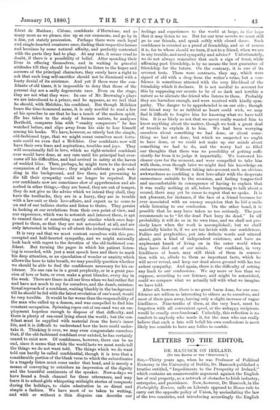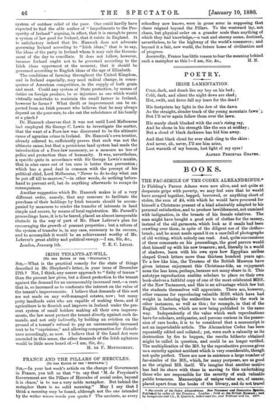LETTERS TO THE EDITOR.
DR. HANCOCK ON IRELAND.
[TO THE EDITOR OF TEl SPECTATOR:1
SIR,-Thirty years ago, when he was Professor of Political Economy in the University of Dublin, Dr. Hancock published a treatise entitled, "Impediments to the Prosperity of Ireland," which contains an unanswerable argument against the English law of real property, as a network of obstacles to Irish industry, enterprise, and providence. Now, however, Dr. Hancock, in the Fortnightly Review, calls on Liberals opposed to Home rule to carry out the opposite policy of Union, by assimilating the law of the two countries, and introducing accordingly the English system of outdoor relief of the poor. One could hardly have expected to find the able author of "Impediments to the Pro- sperity of Ireland" arguing, in effect, that it is enough to prove a system of law good for Ireland, that it exists in England. It is satisfactory indeed that Dr. Hancock does not advocate governing Ireland according to "Irish ideas," that is to say, the ideas of the party in Ireland whom it may suit the Govern- ment of the day to conciliate. It does not follow, however, because Ireland ought not to be governed according to the Irish ideas uppermost at the moment, that it should be governed according to English ideas of the age of Elizabeth.
The conditions of farming throughout the United Kingdom, and in Ireland especially, may need radical change, in conse- quence of American competition, in the supply of both grain and meat. Could any system of State protection, by means of duties on foreign produce, be so injurious as one which would virtually undertake to maintain the small farmer in Ireland, however he farms ? What thrift or improvement can be ex- pected from an Irish peasant who believes that he may always depend on the poor-rate, to eke out the subsistence of his family at a pinch?
Dr. Hancock observes that it was not until Lord Melbourne had employed Sir George C. Lewis to investigate the matter, that the want of a Poor-law was discovered to be the ultimate cause of agrarian crime in Ireland. Dr. Hancock's own treatise, already referred to, sufficiently proves that such was not the ultimate cause, but that a pernicious land system had made the introduction of a Poor-law necessary, as a measure no less of police and protection than of humanity. It was, nevertheless, a specific quite in accordance with Sir George Lewis's maxim, that in nine cases out of ten cure is better than prevention ; which has a good deal in common with the precept of his political chief, Lord Melbourne, "Never to do to-day what can be put off till to-morrow,"—in other words, do nothing before- hand to prevent evil, but do anything afterwards to escape its consequences.
Another suggestion which Dr. Hancock makes is of a very different order, namely, that any measure to facilitate the purchase of their holdings by Irish tenants should be accom- panied by measures to render the transfer of interests in land simple and secure, by means of local registration. Mr. Parnell's proceedings have, it is to be feared, placed an almost insuperable obstacle in the way of part of Mr. Shaw Lefevre's plan for encouraging the growth of peasant properties ; but a reform of the system of transfer is, in any case, necessary to its success, and to accomplish it would be an achievement worthy of Mr. Lefevre's great ability and political energy.—I am, Sir,



































 Previous page
Previous page